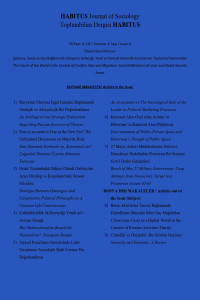27 MAYIS ASKERİ MÜDAHALESİNİN NETİCESİ: DEMOKRASİ HEDEFİNDEN PRETORYAN BİR SİSTEME 62-63 DARBE GİRİŞİMLERİ
Abstract
27 Mayıs 1960 tarihinde Silahlı Kuvvetlere mensup bir grup subayın Cumhuriyetin kurucu değerlerinden uzaklaşıldığı gerekçesiyle emir komuta zinciri dışına çıkarak gerçekleştirdiği müdahale, sadece tüm siyasi faaliyetleri askıya alarak hükümeti devirmekle kalmamış, etkileri günümüze kadar devam eden ve sadece ordunun siyasallaşma neticesinde siyasete müdahale ettiği değil, topyekûn siyasallaşmanın orduyu bir siyasal güç olarak ortaya koyduğu pretoryan bir yapının ortaya çıkamasına neden olmuştur. 27 Mayıs darbesini gerçekleştirenler yeni anayasa ve yeni bir düzen öngörürken, sivil idareye daha çok sistemi işletme görevini vermişlerdir. Müdahalenin hiyerarşi dışında gerçekleşerek başarıya ulaşması, ordu içindeki subaylarda “ben de darbe yapabilirim” düşüncesinin canlandırmıştır. Nitekim darbe sonrası yapılan ilk genel seçimlerde istenilen sonucun alınamaması askeri rahatsız etmiş ve zaten birlik olmayan ordu içindeki farklı grupların ortaya çıkmasına sebep olmuştur.Çalışma, bu düşüncenin ilk örneği olan 1962-63 Albay Talat Aydemir darbe girişimlerini ordunun içindeki siyasallaşmanın boyutlarını detaylarıyla ortaya koyarak tartışmayı hedeflemektedir.
References
- Ahmad, F. (1985). İttihatçılıktan Kemalizm’e, F. Berktay (Çev.), İstanbul: Kaynak Yayınları.
- Atatürk, M. K. (1996). Nutuk, Cilt I-II, İstanbul: Millî Eğitim Bakanlığı Yayınları.
- Atatürk’ün Söylev ve Demeçleri. (1997). 3 Cilt, Ankara: Türk Tarih Kurumu Basımevi.
- Atay, F. R. (2004). Çankaya, İstanbul: Pozitif Yayınları.
- Aydemir, Ş. S. (1999). İkinci Adam I(a), II (b), III (c), İstanbul: Remzi Kitabevi.
RESULT OF MAY 27 MİLİTARY INTERVENTİON: COUP ATTEMPTS FROM DEMOCRACY TARGET TO A PRAETORİAN SYSTEM 62-63
Abstract
The intervention carried out by a group of officers from the Armed Forces on 27 May 1960 by stepping out of the chain of command on the grounds that they distanced themselves from the founding values of the Republic, not only overthrew the government by suspending all political activities, but also overthrown the government, the effects of which continue to the present day, not only that the army intervened in politics as a result of politicization, but also that it led to total politicization. This led to the emergence of a praetorian structure in which the army was revealed as a political power. While those who carried out the 27 May coup envisaged a new Constitution and a new order, they assigned the civilian administration the task of operating the system. The success of the intervention by taking place outside the hierarchy has revived the thought of "I can also make a coup" among the officers in the army. As a matter of fact, the failure to achieve the desired result in the first general elections held after the coup disturbed the military and caused the emergence of different groups within the army that were not already united. The study aims to discuss the 1962-63 Colonel Talat Aydemir coup attempts, which is the first example of this idea, by revealing the dimensions of politicization in the army in detail.
References
- Ahmad, F. (1985). İttihatçılıktan Kemalizm’e, F. Berktay (Çev.), İstanbul: Kaynak Yayınları.
- Atatürk, M. K. (1996). Nutuk, Cilt I-II, İstanbul: Millî Eğitim Bakanlığı Yayınları.
- Atatürk’ün Söylev ve Demeçleri. (1997). 3 Cilt, Ankara: Türk Tarih Kurumu Basımevi.
- Atay, F. R. (2004). Çankaya, İstanbul: Pozitif Yayınları.
- Aydemir, Ş. S. (1999). İkinci Adam I(a), II (b), III (c), İstanbul: Remzi Kitabevi.
Details
| Primary Language | Turkish |
|---|---|
| Subjects | Sociology |
| Journal Section | Review |
| Authors | |
| Publication Date | March 30, 2023 |
| Published in Issue | Year 2023 Volume: 4 Issue: 4 |



